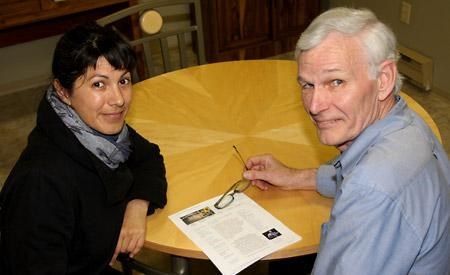A group of residents working on the Sustainability Charter for the Powell River Region has organized a forum to engage the community.
Powell River Regional District, City of Powell River, Tla’Amin (Sliammon) First Nation, School District 47 and Vancouver Island University (VIU) are all partners in the sustainability charter. More a guideline than a set of concrete rules, the charter was designed to be used by government, businesses, groups, organizations and individuals.
The ad hoc group is hosting an event on Tuesday, May 24, called Vision Powell River. It takes place from 6:30 to 9 pm at Max Cameron Theatre.
The forum is intended to be a starting point for a community-based forum to move forward from the creation of the charter and look at how to take it to the next level, explained Claudia Medina, one of the members of the group. The idea, she added, is to “give it life, in many forms, to review it and also go through what it actually means to us and how do we actually move forward with action.”
The event is also a way to bring people together to relate the charter to what has already been happening, Medina said. “We’ve invited groups who are reactive in the community in different areas of sustainability to participate, as well as the general population, as a way of acknowledging the work that’s being done and see how we can consolidate,” Medina said. “In doing that, we’ll put forward the concept of an enabling committee.”
Graham Cocksedge, another member of the group, said the probability of the community having to face a dramatic increase in the percentage of residents who cannot pay anymore is getting greater every day. “Most of the world models right now are suggesting the early ‘20s is going to be a real crunch in terms of raw materials,” he said. “That in turn is going to affect everything from food production to industry and the usual way of doing business.”
The need to be able to coordinate community activities, let alone set the fibre and the fabric of the community, could well be greatly challenged in the next little while, Cocksedge said. In the event of a sudden market collapse, for example, a small community can organize fairly quickly in order to still function, he added. “As a community of 20,000, we don’t have that luxury,” he said. “There really needs to be some kind of structure in place that everybody can turn to, to help coordinate the resources of the community and the demands of the community.”
The group has been looking at a resource allocation technique that everybody could buy into and work with, Cocksedge said. “The first step would be to have an enabling committee that can help establish the community resource,” he said. “It would try to establish a database for community resources, including all of the skills, experience and inclinations of the individual citizens.”
That database would help activities that are underway as well, Cocksedge said.
A second initiative involves operational research, Cocksedge said. “These two things in conjunction with VIU makes a great deal of sense, because of the technical expertise involved,” he said.
The third initiative is to establish a working forum where an interchange can take place, he added.
This approach is about creating a structural template for resiliency, Medina said. “The only way that can really happen is if the grassroots components manage to come together and review it and say, where do we go from here,” she said. “It’s looking to create a more formalized structure where there’s a committee of people that are a core group which keeps in touch the community at large.”
The regional district board voted at the March meeting to contribute $2,000 from the general grants-in-aid account for work organizing and hosting the community forum and for preparing a follow-up report.



